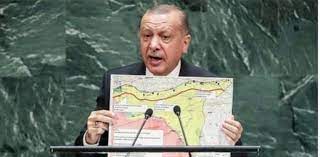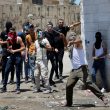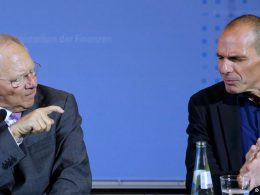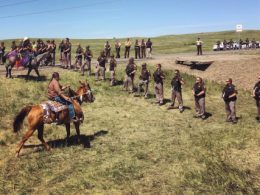By Serge Jordan, International Socialist Alternative (the international movement that the Socialist Party is a part of)
A new major land operation by the Turkish army against Rojava —the de facto autonomous and predominantly Kurdish region of northern Syria— might be imminent. The decaying rule of dictator-President Recep Tayyip Erdoğan, gripped by mounting opposition and economic crisis at home, is seeking military success abroad to deflect attention from its domestic failures. Since last month extensive air attacks and shelling have already been undertaken by the Turkish army inside Rojava, as well as in Southern Kurdistan (the Kurdish region located in northern Iraq), killing dozens of people. A ground assault, if it happens, will only bring more bloodshed and mass displacement of people — while potentially helping foster ethnic strife and a revival of jihadist outfits.
In early December, the Turkish Defence Minister Hulusi Akar called on the US to show “understanding” over a likely new military offensive in northern Syria, just after US officials had voiced their “strong opposition” to such a move. This opposition, however, is by and large rhetorical, combined as it is with declarations clarifying that Turkey has the “right to defend itself”. On a two-day visit to Ankara, German Interior Minister Nancy Faeser also said that the German government “stands by Turkey” in its fight against terrorism, although it was sprinkled with urges to be “proportionate”.
Biden’s administration and its NATO partners are certainly uneasy about Erdoğan’s plans. There are today several US bases in northeastern Syria and around 900 US troops still working alongside the Syrian Democratic Forces (SDF), whose backbone is the Kurdish YPG/YPJ (People’s Protection Units/Women’s Protection Units). At the end of November, a Turkish drone strike targeting a Kurdish base hit less than 300 meters from US forces stationed there. Western imperialist leaders are also concerned about the public exposure of their hypocrisy: from their perspective, unlike Vladimir Putin’s crimes in Ukraine, those of Erdoğan’s regime against the Kurds have no geostrategic dividends.
But when push comes to shove, those powers need Turkey on their side, first and foremost for their project of NATO expansion via the new would-be members, Finland and Sweden; and they will not allow Kurdish blood to stand in their way. Erdoğan also happens to be one of the few NATO leaders still maintaining a line of communication with Putin —a useful asset for the US and EU, like when he spearheaded a deal allowing the resumption of Ukrainian wheat exports through the Black Sea this summer. Practically, Western imperialist powers are thus in no mind to thwart Erdoğan’s plan of having yet another brutal go at the Kurds.
Erdoğan has pushed his luck towards Putin too, recently telling him it was imperative Russia helps “clear” Kurdish forces from northern Syria. The Russian military is bogged down in its war campaign in Ukraine, and cannot afford alienating Turkey either —the only NATO member which has not rallied behind the sweeping economic sanctions imposed on Russia by Western powers. Turkey has in fact more than doubled its trade with Russia in 2022 compared to the year before. Although it has supported the Ukrainian army with drones, it has kept strong military ties with Russia all the while. Putin also wants Turkey to become a new “gas hub” that could provide an alternative route to redirect its gas exports to the EU, after the damage provoked to the two Nord Stream pipelines in the Baltic, and the German government’s decision since February to freeze Nord Stream 2.
The shift in the main imperialist powers’ geo-political priority due to the “New Cold War”, as well as the leverage Turkey currently has in its hands to maneuver between both sides, create a window of opportunity Erdoğan wants to exploit.
Escalation
Erdoğan has been threatening a new ground invasion in Rojava for months. After a bomb blast in a shopping street in Istanbul killed six people on November 13, these threats have become more open, and unprecedented Turkish reinforcements have been amassed along the border. The Turkish regime immediately blamed that attack on the PKK (Kurdistan Workers’ Party) and on its Syrian sister group the PYD (Democratic Union Party, the political branch of the YPG/YPJ), despite both denying any involvement. Since then, the Turkish army has been pummeling Kurdish positions across northern Syria and Iraq through a deadly mix of air and artillery attacks.
The Istanbul bombing is not a reason for this war but merely a pretext for the Turkish government to accelerate plans that predate this attack. The Turkish ruling class has long cherished the idea of crushing the Kurds militarily and to bring an end to their aspirations for self-rule. Erdoğan’s regime has carried out three cross-border offensives targeting Kurdish forces in northern Syria before —in 2016, 2018 and 2019— taking two major bites out of Rojava’s territory, including the strategic district of Afrin in the northwest (in which the Turkish military is now acting as an arbiter between competing islamist and jihadist militias it has promoted) and a key strip along the border that includes important agricultural lands.
Another, more immediate motivation is driving the Turkish dictator-President’s efforts: to try and prolong his rule and distract from the deep political, economic and social crises he is confronted with in Turkey itself, in view of next June’s parliamentary and presidential elections. Turkey’s official inflation rate exceeds 80%, making it the fourth highest in the world, while according to a new study by the country’s Consumer Rights Association, more than 76.5 million people now live below the poverty line —corresponding to more than 90% of Turkey’s population. These explosive social conditions have provoked several strike waves in the past year and a steady decline of support for the ruling Justice and Development Party (AKP), now at a historic low.
According to an August 2022 survey of polling company Metropoll, Erdoğan has fallen behind all the potential presidential candidates of the main pro-capitalist opposition front, the ‘Nation Alliance’. Since all the parties in this alliance tacitly favor Turkey’s cross-border attacks on Rojava and none of them favors the Kurds’ right to self-determination, Erdoğan hopes that whipping up further nationalist frenzy and polarization will undermine the Kurdish vote for the said opposition, which is a critical voting bloc. A new war could even be the prelude to an outright legal ban on the left-leaning and pro-Kurdish Democratic Peoples’ Party (HDP), which despite having faced heavy repression (with its leader Selahattin Demirtaş in jail since 2016), still has a large support base amongst the Kurdish population. Such a move, if successful, could provide an electoral edge to the ruling party.
The timing of this new Turkish military campaign, coming in the wake of the hugely impactful revolutionary uprising in Iran, is also no accident. The Kurdish masses have played a leading role in that struggle, acting as an encouraging beacon for the Kurds of Turkey, Iraq and Syria, and for the region’s working class as a whole to rise up against repressive rule and grinding poverty. For the Turkish ruling elite, this factor brings an additional urge to “teach a lesson” to the Kurds and foment division.
These are all more compelling reasons for the regime to act than any supposed security or military threat posed by Kurdish groups. Yet some of the recent actions undertaken by the YPG have unfortunately facilitated the propaganda of the Turkish regime. Rockets launched by the YPG in retaliation to the Turkish state’s bombings have claimed the lives of a number of civilians on the Turkish side of the border. On 21 November, one of these rockets hit a school in Karkamış, killing at least two people, including a five year-old boy. If landed minutes before, dozens could have been killed. This type of indiscriminate rocket fire does not assist the defense of Rojava, as it is seized upon by the regime to rally nationalists at home and drum up support to escalate its military offensive.
Mass opposition needs to be built to stop Erdoğan’s war machine and its new slaughter of the Kurdish people, including through the democratically-organised and multi-ethnic armed self-defense of Rojava by its people against any aggression from the Turkish army or its proxy jihadist foot-soldiers. For this to be done effectively though, no illusions can be entertained about lobbying imperialist powers, who have stabbed the Kurdish people in the back more times than it is possible to recall. Demanding a “stronger” message from the US to stop a Turkish assault, as some SDF and PYD leaders currently do —despite the Turkish army having invaded Rojava’s territory several times before without the US lifting a finger— will pave the way for further disillusions, betrayals, isolation and defeat. Besides, such appeals to imperialism, alongside spreading illusions about support from Washington, oils the propaganda machine of those regimes like the Iranian theocracy who are hiding behind an anti-imperialist veneer to justify their own bloody repression of the Kurdish movement.
Other senior PYD figures, basing themselves on the untrustworthiness of the White House, have urged for some kind of reconciliation with Syrian butcher-President Bashar al-Assad himself and his Russian backers, that would put Rojava under the tutelage and arguable protection of Damascus. This would practically amount to a “kiss of death” with a regime that has savagely oppressed the Kurds within its borders for many decades. In fact, Erdoğan himself is trying to re-normalise its relations with al-Assad. Moves towards a detente between the two regimes have been initiated; one potential basis for this being a revival of the 1998 Adana agreement, that saw Syria pledging not to allow any PKK activities on its territories (where the PKK had its base up till then), and to keep Kurdish activists away from the Turkish border. Far from an ally of the Kurds, al-Assad would happily conspire with Erdoğan over their bones.
It should now be forcefully clear that in their resistance against the threat of new Turkish imperialist bloodshed, the Kurds cannot rely on any external or regional power and their fake promises; their only objective allies are the workers and oppressed in the region and around the world. The revolutionary uprising that has shaken the Iranian Mullahs for over four months, in which Kurdish women, youth and workers have been a driving force, has given an inspiring example of the type of struggle that, if politically organized, could placate and eventually defeat Erdoğan’s regime, and of the allies the Kurds of Rojava really need — to resist the upcoming onslaught but also to achieve their aspirations to self-rule, genuine democracy, peace, women’s liberation and social justice. By boldly championing a truly democratic socialist program whereby the region’s main resources would be placed under the control of workers and poor peasants, and by consciously appealing to the masses of the region on that basis, the people of Rojava would strengthen the sympathy for their struggle and undermine the support for the war within Turkey itself, including among the many poor conscript Turkish soldiers who have no vested interests in fighting it.
The population in Turkey is bearing the brunt of the AKP’s policies and capitalist crisis with skyrocketing prices, low wages and rising youth unemployment. The country’s defense budget is expected to reach $15.8 billion in 2023, witnessing an annual growth rate of 8.36%, according to a report by the Strategic Defence Intelligence. This war budget will be exacted from the millions who are already going hungry and struggling to pay their rents. This shows in no uncertain terms that the struggle against the Turkish government’s militarist agenda and the struggle of the workers’ movement against poverty and exploitation are deeply interconnected.
Renewed onslaught against the Kurds all around
A wider reactionary pushback against the Kurds is currently unfolding across the Middle East. The Iranian regime has carried out a large number of air strikes against Kurdish areas in northern Iraq over the past months, trying to self-replicate its own narrative of “foreign meddling” in the mass protests shaking its rule. While this is happening, an escalation of attacks on the Kurds is taking place within Turkey, where State repression against the HDP and Kurdish activists is intensifying, and even more so within Iran itself —where other ethnic and religious minorities (Arabs, Balochis, Azeris, Turkmen, Sunnis) are also under particularly brutal attack.
Over a quarter of the protesters killed so far in the repression of the revolutionary movement in Iran come from the Kurdish community. In the Kurdistan province (or Eastern Kurdistan), the epicenter of the uprising, the so-called Islamic Revolutionary Guard Corps, the Basiji paramilitaries, the police and military forces have all been unleashing ferocious violence against the local population, transforming Kurdish cities into near-war zones. Pro-regime propaganda describes the area as a nest of sympathizers of “separatist groups”. The Iranian dictatorship wants to make a bloody example of the Kurds and through this, intimidate the masses in other parts of Iran; but it also hopes to derail the mass struggle into an armed ethnic confrontation to divide the revolutionary movement and push the Iranian people off the streets.
In short, the Kurdish question is sharply coming back onto the agenda in every part of Kurdistan —but also beyond. In fact, it has not been internationalized to such an extent for a number of years. Beyond the wide-ranging effects of the revolutionary struggle in Iran, this is also due to Erdoğan regime’s maneuvers within NATO. Heading the second largest army of the alliance and placed in a very important geostrategic region, the Turkish President is leveraging its position to extract concessions through blackmail at a time of NATO’s attempted enlargement. In this context, other NATO states with significant Kurdish diasporas are increasingly acting like the Turkish State’s crime accomplices by taking action against Kurdish activists in their own country. It is in Sweden, which is knocking on NATO’s door and has just seen the arrival of a new right-wing government, where this process is taking the sharpest expression. Sweden has beefed up anti-terror laws, lifted its arms embargo to Turkey and accelerated the deportations of Kurds, all after explicit Turkish government requests.
But this situation is by no means restricted to Sweden. The UK has also resumed the flooding of Turkey with weapons, which will undoubtedly be used against Kurdish civilians, and Finland is likely to be next. In Germany, fans of the Bayern Munich football club have even been beaten up by the police at a regional league match because they were holding up a banner with the inscription “FC Bayern Fanclub Kurdistan”. These examples are further evidence, if need be, that NATO and capitalist western states, despite their hue and cry about defending democratic values, are no friends of the Kurds and will once more readily throw them under the bus to pursue their imperialist ambitions.
On the other hand, the working class and young people in those countries share with the Kurdish people a common enemy: their own capitalist governments who are doing the bidding for the Turkish dictatorship, undermining the living standards of the majority in their home countries, and promoting militarist drives that will be paid through renewed austerity. That is why left, trade union and workers’ organizations internationally should actively support the Kurdish people’ struggle for their right to exist and democratically decide their own future, resist all anti-democratic and racist attacks on the Kurdish community, oppose any moves towards more imperialist wars and NATO expansion, and build solidarity with the heroic struggle of the Iranian masses.
- Stop the Turkish and Iranian states’ war against the Kurds in all parts of Kurdistan — Turkish troops out of northern Syria now
- International solidarity with the resistance of Rojava´s Kurds, with the revolutionary movement in Iran, and with all workers, youth and oppressed peoples in struggle across the region
- Support the right to self-determination in every part of Kurdistan — all Kurds must be free to take a democratic decision on the character of the state they want to live in — defend equal political, economic and social rights for all minorities and oppressed groups
- Restore all democratic rights and release political prisoners in Turkey and Iran
- No arms trade with Erdoğan’s war machine — stop the Turkish government’s war budget — use the resources for working and poor people’s benefits instead
- For united action by Kurdish and Turkish workers’ organizations against the war and the cost-of-living crisis
- No to NATO and to a new arms race
- Stop deportations of Kurdish activists from Europe, defend the right to asylum
- Down with Erdoğan’s regime, down with the Mullahs and with all the oppressive and exploitative regimes of the region
- For a mass, united struggle against capitalism and imperialism
- For a voluntary, democratic and socialist confederation of all workers and oppressed peoples across the Levant and the wider Middle East












